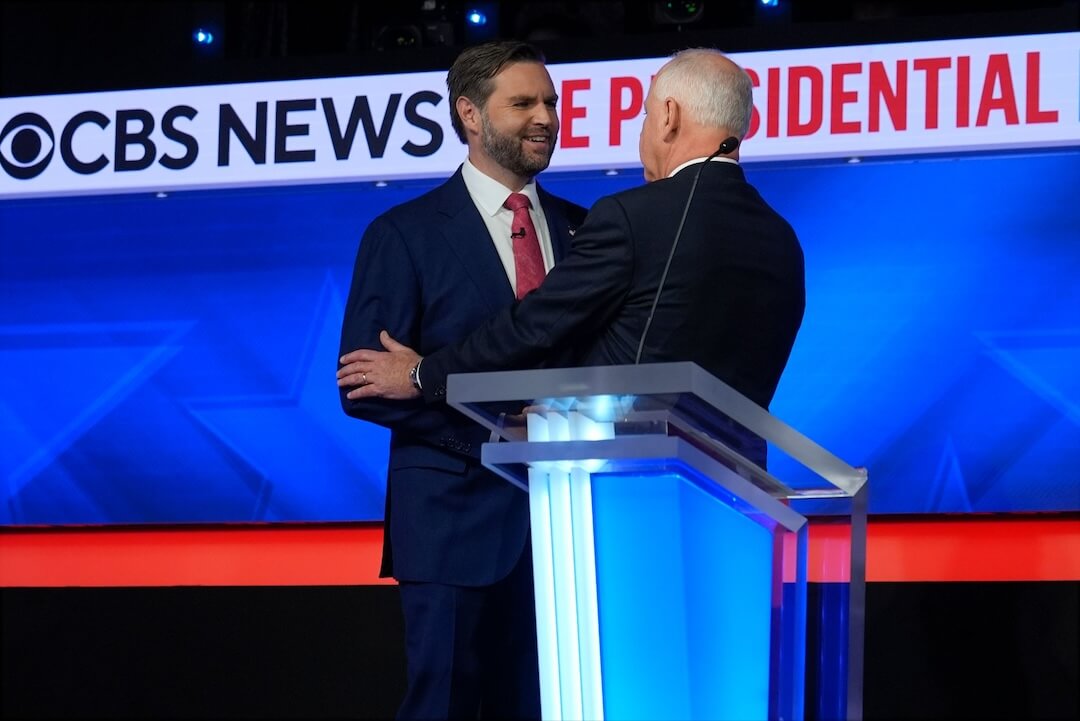Hey, a substantive debate.
Vice presidential candidates JD Vance and Tim Walz debated Tuesday and, dare I say, it was a decent debate. They shook hands (twice) before it started and shook hands again after it was over.
In between, they agreed some, they disagreed a lot, they sort of stayed on topic, and were overall civil and respectful. Vance landed some good jabs against Kamala Harris. Walz landed some good jabs against Donald Trump. Commentators praised Vance’s first half and Walz’s second half. Both sides, surely, will claim victory.
So let’s cut to the chase and answer the question that you want to know: Who won the debate?
I’d give the slight edge to … moderators Margaret Brennan and Norah O’Donnell of CBS News.
They did their jobs, as far as the jobs they were assigned.
Now, some people might have a legitimate complaint over the job the moderators were asked to do. Most notably, there is fair criticism that the moderators were not going to vigorously fact-check the candidates. Instead, they facilitated the debate by asking, and occasionally prodding, the candidates to fact-check one another.
However, there were moments when the moderators did a little fact-checking. They called out Vance on a climate change claim and then, in the most provocative moment of the night, angered Vance by talking about how Haitians in Springfield, Ohio, were in the U.S. legally. That led Vance to go into an explanation of how the law worked that didn’t end until Brennan told both candidates, “The audience can’t hear you because your mics are cut.”
She was mainly talking to Vance.
After the debate, MSNBC’s Nicolle Wallace said, “(The moderators) did a great job, and they also used their mic muting power. And I actually think if you’re a woman that might be the worst moment JD Vance had, because he was going to mansplain right over that mute button.”
But there wasn’t much on-air fact-checking beyond that. (CBS hosted a live blog that included fact-checking.) Again, you can question CBS for that decision, but the moderators followed their assignment.
In addition, Brennan and O’Donnell hit most of the big talking points: immigration, health care, women’s rights, child care, climate (including Hurricane Helene), guns, the economy and democracy, including Jan. 6 and the peaceful transfer of power. They talked about Vance’s flip-flopping on past Trump statements, and Walz’s past comments about being in the military. They asked about Israel, but oddly did not ask about Ukraine in perhaps the one major omission of the night.
But, overall, it was a good night for Brennan and O’Donnell. Think of it this way: When the candidates are the stars of the night, and the conversation is remembered for what the candidates say, and the moderators essentially stay out of the way, then the moderators usually have given a good performance.
After the debate, the networks weighed in, some saying Vance won, others claiming it was Walz’s night. And there were the usual pointless and hard-to-believe, cliched interviews with people claiming to be undecided voters. (Really? There are still undecided voters who might be swayed by a vice presidential debate?)
Which brings me to this point: As substantive, informative and entertaining as it was, did Tuesday night’s debate even matter?
In a piece where four New York Times’ opinion columnists weighed in before Tuesday night’s debate, David Brooks wrote, “As for debate performances, I genuinely don’t think it matters electorally. V.P.s scarcely matter even in the most volatile of campaigns. This year voters are locked in. The election is being shaped by basic demographic and economic realities, not the day-to-day doings of the candidates. Harris did a total beat-down on Trump in the debate and it helped her in the national polling a bit, but not by much. I’m struck by how few people I meet want to talk about the campaign.”
Tressie McMillan Cottom added, “I agree that this debate will not matter electorally. No one chooses a president based on a vice-president debate.”
CNN’s David Axelrod summed up the night after the debate was over, saying, “I don’t think it changes the race at all. It was an interesting night, but I don’t think it changes the race at all.”
Sign up for The Poynter Report, our daily newsletter for everyone who cares about the media, for more media commentary and analysis like this. Subscribe to The Poynter Report here.







